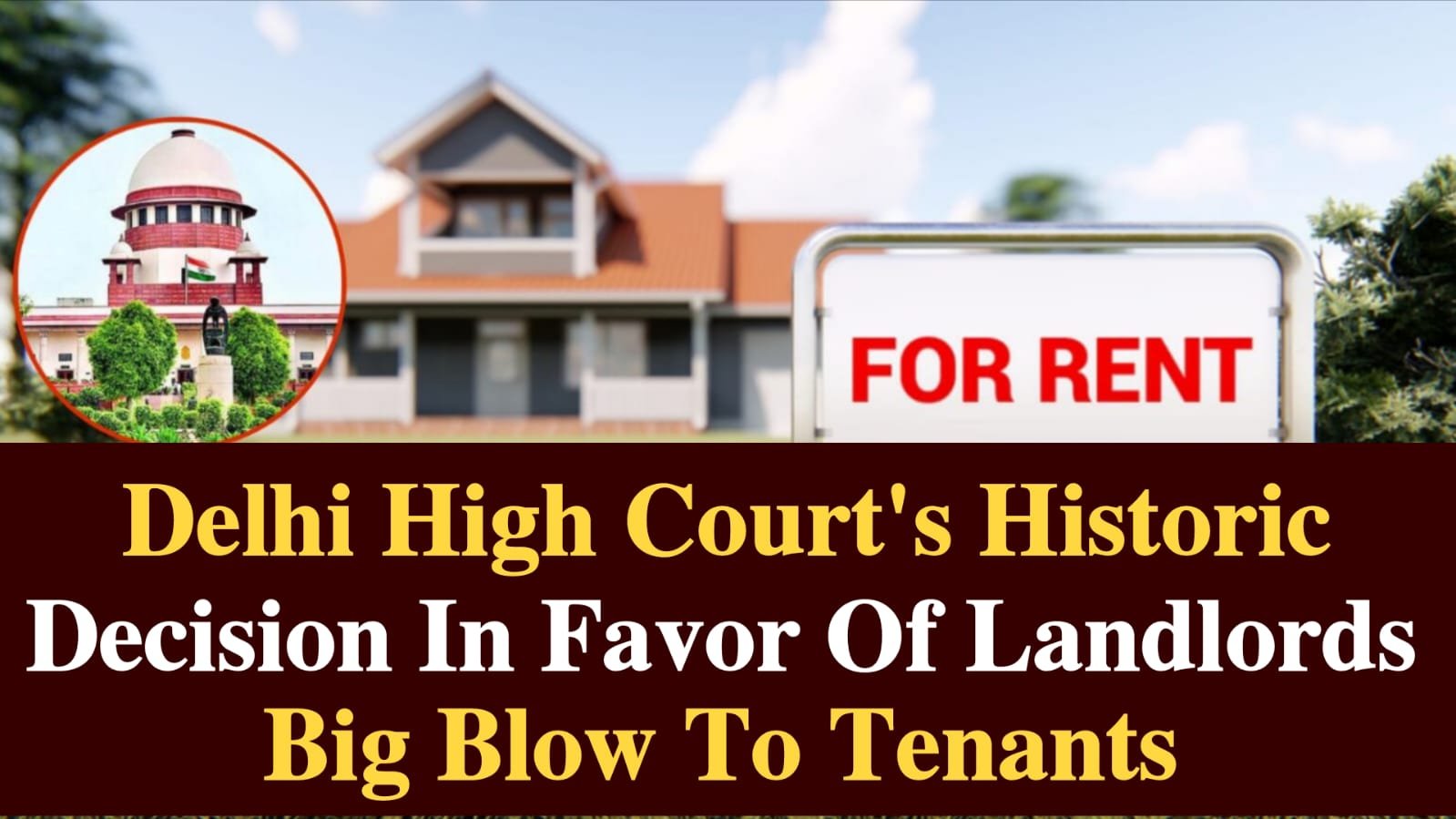Tenancy Law : In recent times, disputes between landlords and tenants have become increasingly common across India. These disagreements often escalate, sometimes even reaching the doors of courts. A recent case that came before the Delhi High Court has now set a significant legal precedent, bringing relief to landlords while delivering a strong message to tenants.
This ruling is expected to have wide-reaching implications, especially for those who rent out properties for extra income and for the large population that lives in rented accommodations. Let’s take a closer look at what the Delhi High Court has said and why this judgment is being considered so important.
Tenancy Law : The Background: Renting as a Source of Income and Shelter
In today’s urban society, many individuals rent out a part or whole of their property to earn supplementary income. At the same time, due to rising real estate prices and employment-driven migration, renting has become the most practical housing solution for a vast number of people.
However, the landlord-tenant relationship is not always smooth. It is not uncommon for conflicts to arise over maintenance, rent increments, or property usage. This case, which has now resulted in a landmark judgment, revolves around a dispute of similar nature.
Tenancy Law : Delhi High Court’s Strong Observations
The Delhi High Court, while pronouncing this verdict, made it clear that a tenant’s rights are limited strictly to occupying the property upon payment of rent. The court clarified that tenants cannot dictate how a landlord uses their own property, nor can they interfere in decisions related to the utilization of the property.
The court added that a tenant is bound by the terms and permissions provided by the landlord, and under no circumstances can a tenant assume authority over property usage, renovations, or personal preferences of the landlord regarding their space.
Tenancy Law : Only the Landlord Can Decide How to Use Their Property
According to the court, the power to decide how a property is to be used rests solely with the landlord. A tenant has no legal standing to suggest or oppose such decisions, as ownership rights supersede occupancy rights.
This principle becomes especially crucial when a landlord needs the property for personal or family use. In such cases, the tenant is legally obligated to vacate the premises, provided that the landlord’s intention is genuine, honest, and backed by valid reasons.
Tenancy Law : Tenants Must Vacate If Landlord Needs Property for Personal Use
The High Court stressed that when a landlord requires their property for their own use—or for the use of immediate family members—tenants cannot refuse to vacate simply because they have been living there for a long time. If the landlord’s claim is justified and bona fide, the tenant is legally required to leave.
This decision comes as a blow to many tenants who, after occupying a property for years or even decades, begin to feel a false sense of ownership. The court clarified that paying rent does not grant permanent rights, and the legal ownership and control always remain with the landlord.
Court Overturns Lower Court’s Ruling
Interestingly, in this specific case, the lower rent control court had earlier ruled in favor of the tenant. The landlord had argued that due to illness, they needed to move back into the property and also required space for their divorced daughter and a nursing assistant.
However, the rent control court rejected the landlord’s plea, stating that they had failed to provide sufficient medical documentation to support their claim. The tenant argued that there was already enough space in the same building, and the landlord could accommodate family without evicting the tenant.
But upon review, the Delhi High Court disagreed with the lower court’s findings. The High Court held that the evidence provided by the landlord was sufficient and credible. The court emphasized that it is not for the tenant or the court to question why or how the landlord wants to use their own property—as long as the demand appears honest and reasonable.
The Final Judgment: Tenant Ordered to Vacate Within 6 Months
After examining all facts, the High Court ruled in favor of the landlord and overturned the decision of the rent control court. The judgment clearly stated that the tenant must vacate the property within six months from the date of the verdict.
This decision has not only given relief to the particular landlord involved in the case but has also created a significant legal precedent for future disputes of a similar nature.
Details of the Case : A Long-Standing Occupancy
The dispute in question dates back several years. According to the records, the tenant had been residing in the property since 1989, and continued to stay there until 2003, refusing to vacate despite multiple requests from the landlord.
The landlord, an elderly couple, approached the court arguing that they required the property due to health issues and also to accommodate their divorced daughter and a nurse for regular care. Despite this genuine need, the tenant declined to leave, claiming that the landlord already had sufficient space.
Tenant’s Argument Rejected by the High Court
The tenant had contended that the landlord had enough room and there was no pressing need to evict them. However, the Delhi High Court rejected this reasoning, saying that no tenant has the right to assess or dictate how a landlord should utilize their own house.
The court observed that the landlord’s plea was not only genuine but also backed by appropriate evidence. Accordingly, the court granted the petition, ruling that the tenant must vacate the premises.
What This Verdict Means Going Forward
This ruling by the Delhi High Court sets an important precedent in landlord-tenant legal matters. It reaffirms the supremacy of property ownership rights and sends a clear message that:
-
Paying rent does not equate to ownership.
-
Tenants cannot question a landlord’s personal or family requirements.
-
Genuine personal need of the landlord is a valid ground for eviction.
This decision will serve as a strong reference for courts dealing with similar disputes in the future, especially in urban areas where long-term tenants often refuse to vacate.
Conclusion
The Delhi High Court’s judgment marks a turning point in property rental law. It reinforces the principle that a landlord’s ownership rights take precedence over a tenant’s occupancy rights, particularly when the landlord needs the property for personal or family use.
While this verdict brings a wave of relief to landlords across the country, it also acts as a warning to tenants: renting a home does not give you a stake in it. The house remains the property of the landlord, and their needs—if genuine—must be honored by law.



